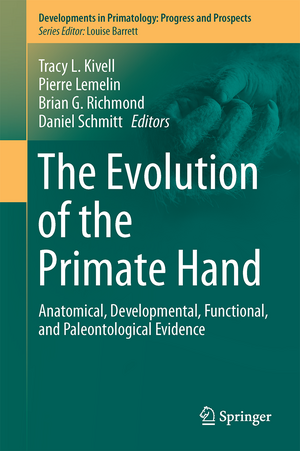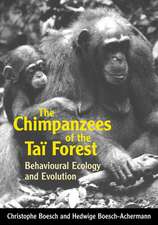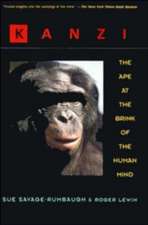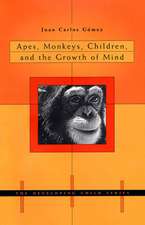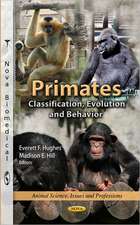The Evolution of the Primate Hand: Anatomical, Developmental, Functional, and Paleontological Evidence: Developments in Primatology: Progress and Prospects
Editat de Tracy L. Kivell, Pierre Lemelin, Brian G. Richmond, Daniel Schmitten Limba Engleză Hardback – 11 aug 2016
| Toate formatele și edițiile | Preț | Express |
|---|---|---|
| Paperback (1) | 1394.69 lei 6-8 săpt. | |
| Springer – 9 iun 2018 | 1394.69 lei 6-8 săpt. | |
| Hardback (1) | 1400.98 lei 6-8 săpt. | |
| Springer – 11 aug 2016 | 1400.98 lei 6-8 săpt. |
Din seria Developments in Primatology: Progress and Prospects
- 20%
 Preț: 571.31 lei
Preț: 571.31 lei - 18%
 Preț: 1216.65 lei
Preț: 1216.65 lei - 19%
 Preț: 578.66 lei
Preț: 578.66 lei - 18%
 Preț: 956.69 lei
Preț: 956.69 lei - 18%
 Preț: 948.92 lei
Preț: 948.92 lei - 18%
 Preț: 948.92 lei
Preț: 948.92 lei - 18%
 Preț: 945.79 lei
Preț: 945.79 lei - 18%
 Preț: 962.66 lei
Preț: 962.66 lei - 18%
 Preț: 1664.43 lei
Preț: 1664.43 lei - 18%
 Preț: 1224.54 lei
Preț: 1224.54 lei - 24%
 Preț: 826.25 lei
Preț: 826.25 lei - 24%
 Preț: 802.74 lei
Preț: 802.74 lei - 18%
 Preț: 1562.94 lei
Preț: 1562.94 lei - 18%
 Preț: 950.21 lei
Preț: 950.21 lei - 18%
 Preț: 943.73 lei
Preț: 943.73 lei - 18%
 Preț: 1549.67 lei
Preț: 1549.67 lei - 18%
 Preț: 1248.20 lei
Preț: 1248.20 lei - 18%
 Preț: 941.38 lei
Preț: 941.38 lei - 24%
 Preț: 800.85 lei
Preț: 800.85 lei - 18%
 Preț: 953.35 lei
Preț: 953.35 lei - 18%
 Preț: 1827.48 lei
Preț: 1827.48 lei - 18%
 Preț: 1214.90 lei
Preț: 1214.90 lei - 18%
 Preț: 957.62 lei
Preț: 957.62 lei - 18%
 Preț: 1231.47 lei
Preț: 1231.47 lei - 18%
 Preț: 1225.48 lei
Preț: 1225.48 lei - 5%
 Preț: 1433.83 lei
Preț: 1433.83 lei - 18%
 Preț: 1231.16 lei
Preț: 1231.16 lei - 18%
 Preț: 1226.90 lei
Preț: 1226.90 lei - 18%
 Preț: 955.25 lei
Preț: 955.25 lei - 18%
 Preț: 956.03 lei
Preț: 956.03 lei - 18%
 Preț: 1218.53 lei
Preț: 1218.53 lei - 18%
 Preț: 950.52 lei
Preț: 950.52 lei -
 Preț: 416.82 lei
Preț: 416.82 lei - 18%
 Preț: 1554.89 lei
Preț: 1554.89 lei
Preț: 1400.98 lei
Preț vechi: 1708.52 lei
-18% Nou
Puncte Express: 2101
Preț estimativ în valută:
268.10€ • 278.21$ • 224.09£
268.10€ • 278.21$ • 224.09£
Carte tipărită la comandă
Livrare economică 17-31 martie
Preluare comenzi: 021 569.72.76
Specificații
ISBN-13: 9781493936441
ISBN-10: 1493936441
Pagini: 302
Ilustrații: XI, 589 p. 64 illus. in color.
Dimensiuni: 155 x 235 x 38 mm
Greutate: 1.02 kg
Ediția:1st ed. 2016
Editura: Springer
Colecția Springer
Seria Developments in Primatology: Progress and Prospects
Locul publicării:New York, NY, United States
ISBN-10: 1493936441
Pagini: 302
Ilustrații: XI, 589 p. 64 illus. in color.
Dimensiuni: 155 x 235 x 38 mm
Greutate: 1.02 kg
Ediția:1st ed. 2016
Editura: Springer
Colecția Springer
Seria Developments in Primatology: Progress and Prospects
Locul publicării:New York, NY, United States
Cuprins
FOREWARD.- Introduction.- On the primitiveness, prehensility, and opposability of the primate hand: the contributions of Frederic Wood Jones and John Russell Napier.- The Primate Wrist.- Morphological Diversity in the Digital Rays of Primate Hands.- The Role of Genes and Development in the Evolution of the Primate Hand.- Organization and Evolution of Neural Control of the Hand in Primates: Motor Systems, Sensory Feedback, and Laterality.- Anatomy, Function, and Evolution of the Primate Hand Musculature.- Comparative and Functional Morphology of the Primate Hand Integument.- Functional Morphology of the Primate Hand: Recent Approaches using Biomedical Imaging, Computer Modeling, and Engineering Methods.- Experimental Research on Hand Use and Function in Primates.- Biomechanics of the Human Hand: From Stone Tools to Computer Keyboards.- Functions of the Hand in Primates.- Patterns, Variability, and Flexibility of Hand Posture during Locomotion in Primates.- The Hands of Paleogene Primates.- The Hands of Subfossil Lemurs.- The Hands of Non-Hominoid Anthropoids.- The Hands of Miocene Hominoids.- Evolution of the Early Hominin Hand.- The Evolution of the Hand in Pleistocene Homo.
Recenzii
“Biological anthropologists and anatomists will find this book indispensable as a reference. The figures and illustrations are excellent, and the chapters are rich in primary data that could be used for original research or class projects. The chapters are detailed yet easy to read. Careful attention to terminology, emphasized with highlighted text, provides important conceptual clarification that will guide future research.” (Vivek V. Venkataraman, The Quarterly Review of Biology, Vol. 93 (03), September, 2018)
Notă biografică
Tracy L. Kivell
Animal Postcranial Evolution (APE) Lab, Skeletal Biology Research Centre, School of Anthropology and Conservation, University of Kent, Canterbury, UK
Department of Human Evolution, Max Planck Institute for Evolutionary Anthropology, Leipzig, Germany
Pierre Lemelin
Division of Anatomy, Department of Surgery, Faculty of Medicine and Dentistry, University of Alberta, Edmonton, AB, Canada
Animal Postcranial Evolution (APE) Lab, Skeletal Biology Research Centre, School of Anthropology and Conservation, University of Kent, Canterbury, UK
Department of Human Evolution, Max Planck Institute for Evolutionary Anthropology, Leipzig, Germany
Pierre Lemelin
Division of Anatomy, Department of Surgery, Faculty of Medicine and Dentistry, University of Alberta, Edmonton, AB, Canada
Brian G. Richmond
Division of Anthropology, American Museum of Natural History, New York, NY, USADaniel Schmitt
Animal Locomotion Lab, Department of Evolutionary Anthropology, Duke University, Durham, NC, USA
Textul de pe ultima copertă
This book demonstrates how the primate hand combines both primitive and novel morphology, both general function with specialization, and both a remarkable degree of diversity within some clades and yet general similarity across many others. Across the chapters, different authors have addressed a variety of specific questions and provided their perspectives, but all explore the main themes described above to provide an overarching “primitive primate hand” thread to the book. Each chapter provides an in-depth review and critical account of the available literature, a balanced interpretation of the evidence from a variety of perspectives, and prospects for future research questions. In order to make this a useful resource for researchers at all levels, the basic structure of each chapter is the same, so that information can be easily consulted from chapter to chapter. An extensive reference list is provided at the end of each chapter so the reader has additional resources to address morespecific questions or to find specific data.
Caracteristici
Covers all primate clades, from strepsirrhines to hominoids, and from the earliest primate fossils and close relatives to the evolution of modern Homo sapiens Provides an in-depth review and critical account of the available literature on primate morphology Addresses primate evolution in a straightforward, accessible language with data-rich tables and illustrations that will serve as a comprehensive guide for any researcher interested in the primate hand
